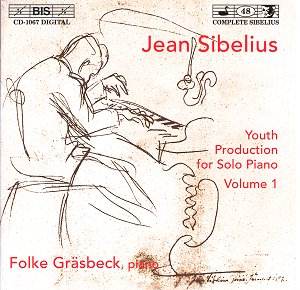JEAN SIBELIUS (1865-1957)
Complete Youth Production for Piano - Volume 1
 Folke Gräsbeck, piano
Folke Gräsbeck, piano
 BIS 1067
[78:33]
BIS 1067
[78:33]
Crotchet
Amazon
UK AmazonUS

Andante in E flat
Aubade in A flat
Au crépuscule (At Twilight) in F sharp minor
Con moto, sempre una corda in D flat
Pieces
Scherzo and Trio in E, E minor
Scherzo (with Trio) in E, A
3 Short Pieces
5 Short Piecez
50 Short Pieces, 'A Catalogue of Themes'
Trånaden - Suckarnas mystèr (Yearning - The Mystery of the
Sighs)
Variations on an harmonic formula in D
This disc, packed to the gunnels with music, is of undoubted academic interest;
but don't buy it if you are on the look-out for undiscovered early masterpieces.
A great deal of the music comes into the category of student exercises -
indeed, tracks 8 to 12 consist of fifty openings, some just a few seconds
long, which the twenty-year-old Sibelius was required to compose as a task
for his teacher at the Helsinki Music Institute. The authentic voice of the
composer is, on the whole, notable by its absence. It's Schumann who seems
to loom largest.
A little more of the real Sibelius in waiting may be found in the Fantasy
for piano with recitation Yearning (The Mystery of the
Sighs). Here, the composer is responding to the poetry of Stagnelius,
recited on the disc by the actor Lasse Põysti. (Strange how beautiful
poetry can be in an almost totally unfamiliar language!) But it still confirms
that the mature composer with his own distinct style is years away - Sibelius
was no youthful prodigy, and it becomes all the more impressive, when one
contemplates the banality and awkwardness of much that is here, that he did,
in time, arrive at such a powerfully individual means of expressing himself.
This disc takes us from 1885 to 1888, and, having voiced the above reservations,
it has to be said that there is a world of difference between the banality
of the Scherzo in E major of track 1 and the characterful, if stunted, Three
Short Pieces that bring the recording to an end.
Folke Grãsbeck deserves praise for completing what must have been,
at times, an unrewarding task. His playing is eloquent, though in his desire
to 'sell' the music, he sometimes goes over the top, and produces a hard
tone. There is also a clicking clearly audible when he plays loud or very
fast notes; possibly a ring or some such? This is actually very distracting,
and I'm astonished the BIS engineers didn't pick it up.
Gwyn Parry-Jones


